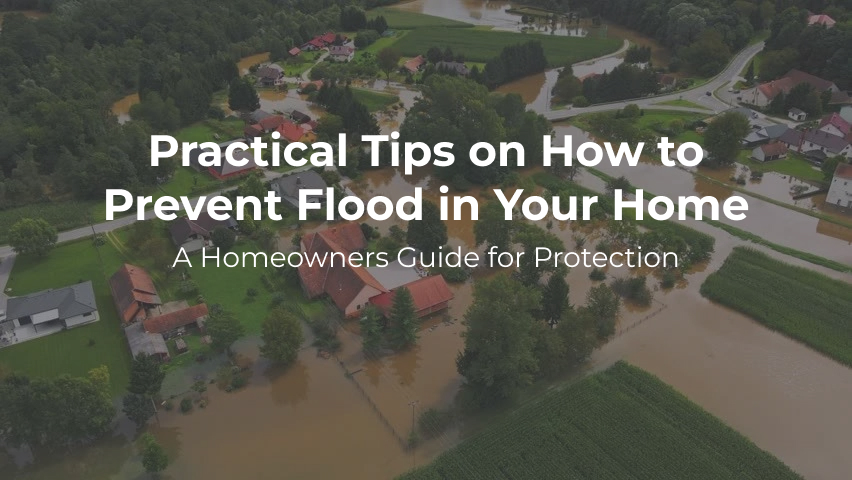
Flood insurance is important for any home or business. According to the Federal Emergency Management Agency (FEMA), just one inch of water can cause $25,000 worth of damage to your property. That’s why FEMA requires home and business owners in flood-prone areas to purchase insurance against floods. But does flood insurance have to be escrowed?
Not all properties must carry flood insurance, but those that do will have to escrow flood insurance. Here’s what you need to know about how it will affect your escrow account and the safety and protection of your home or business.
What Is Flood Insurance Escrow?
When you finance a property, your mortgage lender will open a third-party account known as an “escrow” account. An escrow account ensures insurance premiums and taxes are paid on time. It also tracks all payments, including property taxes, insurance policies, etc. Flood insurance escrow simply means that your escrow account will also cover your flood insurance premiums.
Like your other escrow payments, your lender will collect and manage your flood insurance premiums on your behalf. Your lender will then make payments to your flood insurance provider in a timely manner. By doing so, borrowers can ensure that they make all payments promptly and comply with all flood insurance escrow requirements.
In most cases, insurance escrow will be required for home or business owners with flood insurance. And since standard insurance policies do not cover flood damage, flood insurance is a common purchase for homeowners. That also means your flood insurance premiums and other tax and insurance payments will be managed through escrow.
Does Flood Insurance Have to Be Escrowed?
Is flood insurance required to be escrowed? Yes. According to the FDIC, “Lenders must escrow premiums and fees for flood insurance for any designated loans secured by residential improved real estate or a mobile home that are made, increased, extended, or renewed on or after January 1, 2016.” That means that if your structure is covered by flood insurance, your premiums must be escrowed.
Keep in mind that flood insurance is not universally mandatory. The requirements for the escrow of flood insurance apply only to certain insurance policyholders. However, there are several situations where property owners are legally required to purchase flood insurance for their home or business:
- Your property is located in a high-risk area as designated by FEMA
- Your mortgage is backed by the US government (USDA loans, FHA loans, etc.)
- Your mortgage lender requires flood insurance for homes in high-risk zones
Even if you are not required to purchase flood insurance, this type of policy provides an added layer of protection — with surprisingly affordable rates.
Standard homeowner’s insurance policies don’t offer coverage for flood damage, which may prompt you to consider purchasing additional protection. Does flood insurance have to be escrowed if you buy it voluntarily? The short answer is yes. Anytime you carry flood insurance, it will be included in your escrow account.
Exceptions to Escrowing Flood Insurance
When is flood insurance escrow required? Generally, flood insurance premiums must be included in escrow. However, there are exceptions to flood insurance escrow requirements. There is no mandatory escrow for flood insurance under the following circumstances:
- Your flood insurance is with a smaller lender rather than a bank
- Your lender has less than $1 billion in total assets and doesn’t escrow tax/insurance
- You purchase a condo, and your condo association has sufficient flood coverage
- Your loan is merely an extension of credit for commercial or agricultural purposes
- Your loan is part of a state floodplain management plan
However, if your property doesn’t meet the above criteria, you will be subject to the standard flood insurance escrow requirements. And don’t forget that even if you are not required to purchase flood insurance, it’s typically a wise choice to provide total protection for your residence or commercial property.
Pros and Cons of Escrowing Flood Insurance
In most cases, escrowing flood insurance is merely a matter of satisfying your escrow requirements. Flood insurance is often required for those living in high-risk or flood areas. But flood insurance is wise for anyone seeking total home or commercial property coverage. Here are some of the pros and cons of escrowing flood insurance.
Pros
What are the advantages of escrowing your flood insurance premiums? Most of the benefits of flood insurance escrow revolve around the peace of mind you achieve by relying on your lender to manage your monthly insurance premiums — but don’t forget that if you have flood insurance, you’ll likely be required to escrow your flood insurance anyway.
When flood insurance is escrowed, you gain the following advantages:
- Escrow accounts help borrowers manage their monthly payments
- Your lender can ensure you make on-time payments
- On-time payments prevent lapses in flood insurance coverage
- Lenders may already be escrowing other expenses (taxes, insurance, etc.)
- Flood insurance escrow ensures compliance with mandated requirements
These benefits assure borrowers that they’ve satisfied their escrow requirements and make consistent, on-time payments.
Cons
Are there any potential drawbacks to insurance escrow? Flood insurance is always a wise decision, even if you aren’t required by law to have it. But there can be some drawbacks to escrowing these monthly premiums:
- Some lenders require you to prepay your tax/insurance premiums by several months
- Escrowing removes your control over when insurance premiums are made
- Escrow accounts typically reflect the last tax/insurance rate instead of the current rates
- An unfaithful lender can miss a payment and cause a lapse in coverage
In fairness, these drawbacks can apply to any payments made through an escrow account — they aren’t unique to flood insurance. Nonetheless, it’s crucial to be mindful of these disadvantages and ensure that you understand the terms and conditions of your lender.
How Rocket Flood Can Help
Does flood insurance have to be escrowed? With very few exceptions, flood insurance must be managed that way. While not all home or business owners are required to purchase flood insurance, having this extra coverage for your home or commercial property is always good, especially since standard insurance policies offer little provision for flood damage.
If you need flood insurance, contact Rocket Flood. You can get a quote in under three minutes, with competitive rates and superior coverage. Our fast, hassle-free process can give you total peace of mind in just a few clicks. We are the top digital flood insurance agency offering the most competitive rates in the market.
Doesn’t your property deserve a higher level of protection? As flood experts, we are here to answer your questions such as flood insurance cost. Get started today with Rocket Flood today!
About The Author
Garrett Mitchell is an experienced author and speaker in the field of insurance and financial planning, with a focus on educating homeowners and business owners about flood insurance and the National Flood Insurance Program (NFIP). He is known for his clear and easy-to-understand writing style and engaging presentations.

